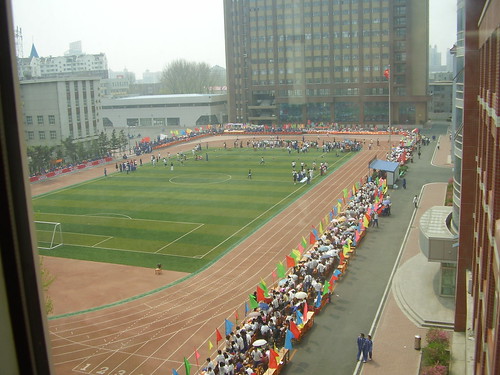You might not realize it, but I took a behind-the-scenes break from Agenda 21. This update begins a rather significant shift in the story, and the last thing anyone needed was to have me tackle that while worn down from writing/transcribing a couple ten thousand words about this crap.
So...Children's Village:
The packed-earth paly yard was empty of children again, its toy energy boards lined up. A woman in a white uniform waited by the main door.
The woman is John's wife Joan, who has been our inside man for the last few chapters. Joan, we learn, has been reclassified as a "Supervisor." Oh, don't go digging back for the updates for those lists - Supervisor is actually a new position, recently developed by the Authority.
That's a small point, but an interesting one. Anyone who has worked for a real-world corporation knows that they love supervisors, with the ratio of supervisor to underling falling to 1:6 or less. It really suggests that these compounds are tiny if they haven't needed any local management until now. Of course, as we discussed earlier, the Republic is such a paragon of unearthly efficiency that perhaps they have no real need of such employees.
Next, we get a description (of sorts) of the Village:
I followed her into the building, down a long, dim hallway and into a room she called her office. She closed the door.
"Have a seat." She motioned to a chair. It looked flimsy and creaked when I sat down. Her desk was small and the surface scratched.
The horror of old, somewhat damaged office furniture! Can you fathom a future in which your workspace is less than pristinely adorned?
"The night shift staff works the pink rooms, the blue rooms, and the nursery."
As with the rest of the book, the description leaves something to be desired. I envision a building I saw in a farming village in Jilin Province. While they had a proper school building, it was only large enough to accommodate the high school students. The junior high classes were held in another building on campus - a single-story concrete box that didn't even have electricity in every room and was so poorly-maintained that my messenger bag ended up with a permanent discoloration from the dirt. That was how I saw the Village the first time I read this thing, as the book was setting me up to view everything as really decrepit. That's not really present in the text, though, and on this readthrough I'm seeing a structure much nicer than the one in my head.
 |
| Not that school, though illustrative in its own way. Did I use that joke already? |
This is one of the curses of this particular subgenre. Earlier, I mentioned the science fiction writer's curse, in which setting your story at a specific future date inevitably means you'll be judged on your accuracy - regardless of whether or not you were actually trying to predict anything. Dystopian writers don't have that problem as their stories are meant to be cautionary, but they have a curse of their own - whatever world they create needs to be in some way worse than someplace that already exists. Harriet Parke tried so hard, but I don't think she quite pulled it off.
No comments:
Post a Comment